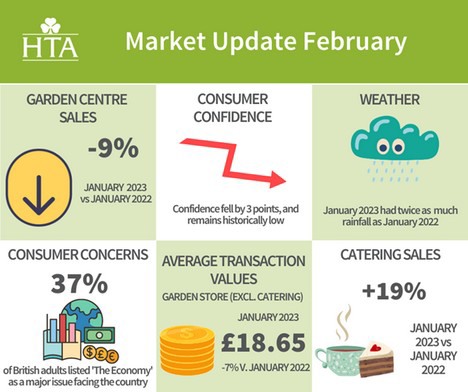The Horticultural Trades Association’s letter to the Chancellor ahead of the Spring Budget sets out clear asks for action on the cost of doing business, water resilience, and trade, as businesses across UK horticulture continue to see soaring costs and face another challenging weather year.
The water shortage that environmental horticulture businesses face is despite an extremely wet start to 2023, with the weather contributing to a negative effect on sales in the garden sector. The trade body that represents the breadth of the industry is calling for the Chancellor to introduce a new grant scheme to support improvements to reservoirs and introduce water-saving innovations. It also reiterates that the energy crisis that came to the fore in 2022 has not gone away.

The HTA’s latest market report for the industry shows garden center sales in January were down by 9% on the same period last year, and average transaction values were also down by 7%. The effect of inflation on wages, energy, and goods has combined with pressures on household finances to severely restrict businesses’ room for maneuvers. The HTA asks for government action to deliver consumer and business confidence.
The environmental horticulture industry is awaiting key announcements on the transition away from peat use and on how borders will operate in the future. These require action and investment, and the HTA’s letter to the Chancellor stresses that the cumulative impacts of policies and regulations must not be overlooked.
Despite these headwinds, UK horticulture remains optimistic that it can play an even greater role in the success of the economy, providing a range of significant monetary, social, and environmental benefits.
Fran Barnes, Chief Executive of the HTA, said: “We have set out clearly where we seek action to ensure that businesses operating in environmental horticulture can thrive and deliver benefits to their customers and communities. It’s obvious that, as an industry, we cannot produce without water, but there are many indirect consequences of shortages, such as not being able to grow the trees we need to combat climate change or have green spaces to help flood resilience. We need to see the government recognize the value of environmental horticulture. We’re already under pressure, as our recent market statistics show, and support is vital.”
Other asks in the HTA’s submission to the Treasury include:
- Continual review of the Energy Bills Discount Scheme and support for business.
- Longer-term rates relief for the retail, hospitality, and leisure industries.
- Extended business rate exemptions to incentivize green business investment.
- Grant funding to trial new growing media to help reduce the use of peat.
- Expand the existing tree nursery production grant scheme to ensure that the industry is able to produce enough trees to meet anticipated future demand.
- Reform the Apprenticeship Levy to ensure it is a viable training option for SMEs.
- Action on trade barriers and border delays.
Environmental and ornamental horticulture in the UK:
- Employs 420,000 people (and supports 674,000 jobs in the UK economy)
- Supports contributions towards UK GDP of £28.8 billion
- Supports tax revenues of £6.3 billion
- Underwrites half of the UK’s 25-year Environment Plan
- Provides physical and mental health benefits
For more information:  Horticultural Trades Association
Horticultural Trades Association
www.the-hta.org.uk
